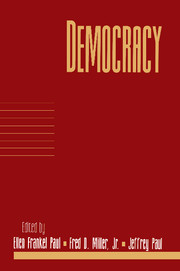Book contents
- Frontmatter
- Contents
- Introduction
- Acknowledgments
- Contributors
- The Very Idea of Popular Sovereignty: “We the People” Reconsidered
- Quasi-Rights: Participatory Citizenship and Negative Liberties in Democratic Athens
- Is There a Duty to Vote?
- Postmodern Liberalism and the Expressive Function of Law
- Democratic Epistemology and Accountability
- Political Quality
- Why Deliberative Democracy Is Different
- The Institutions of Deliberative Democracy
- Democracy as a Telos
- Radical Democracy, Personal Freedom, and the Transformative Potential of Politics
- Democracy and Value Pluralism
- The Problem of Russian Democracy: Can Russia Rise Again?
- Index
Introduction
Published online by Cambridge University Press: 03 May 2010
- Frontmatter
- Contents
- Introduction
- Acknowledgments
- Contributors
- The Very Idea of Popular Sovereignty: “We the People” Reconsidered
- Quasi-Rights: Participatory Citizenship and Negative Liberties in Democratic Athens
- Is There a Duty to Vote?
- Postmodern Liberalism and the Expressive Function of Law
- Democratic Epistemology and Accountability
- Political Quality
- Why Deliberative Democracy Is Different
- The Institutions of Deliberative Democracy
- Democracy as a Telos
- Radical Democracy, Personal Freedom, and the Transformative Potential of Politics
- Democracy and Value Pluralism
- The Problem of Russian Democracy: Can Russia Rise Again?
- Index
Summary
Some twenty-four hundred years ago, Plato disparagingly described democracy as “a charming form of government, full of variety and disorder, and dispensing a sort of equality to equals and unequals alike.” Despite Plato's warning that democracy would degenerate into tyranny, the last decade of the twentieth century has demonstrated that the opposite is possible. Has democracy been vindicated, both in practice and in theory? Only time will tell, but this “charming form of government” has gained territory in the aftermath of the collapse of communist tyrannies around the world, while interest in democratic theory has enjoyed a corresponding renewal. In recent years, political theorists have reexamined traditional themes in democratic theory and given them novel interpretations. The nature of popular sovereignty, the limits of democratic political authority, and radical forms of democracy that involve greater levels of citizen participation have all been subjects of intense debate.
The twelve essays in this volume–written by prominent philosophers and political theorists–explore these issues and related topics. Some essays discuss the appropriate ends of government or examine the difficulties involved in determining and carrying out the will of the people. Some address questions relating to the kinds of influence citizens can or should have over their representatives, asking, for example, whether individuals have a duty to vote, or whether inequalities in political influence among citizens (measured in terms of campaign contributions) can be morally justified.
- Type
- Chapter
- Information
- Democracy , pp. vii - xiiiPublisher: Cambridge University PressPrint publication year: 2000
- 2
- Cited by



